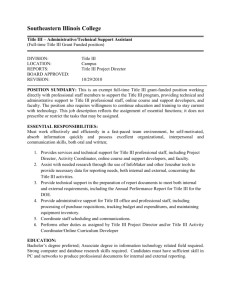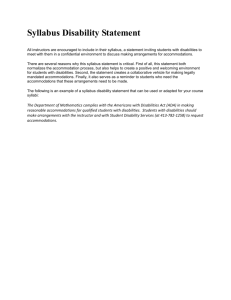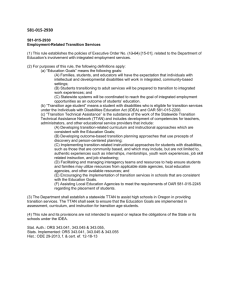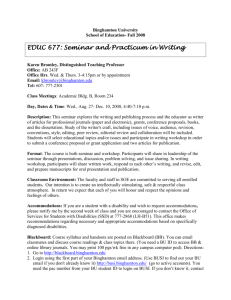Suzanne M. Lachman, MS, CAS Class Times: Wed. 7
advertisement
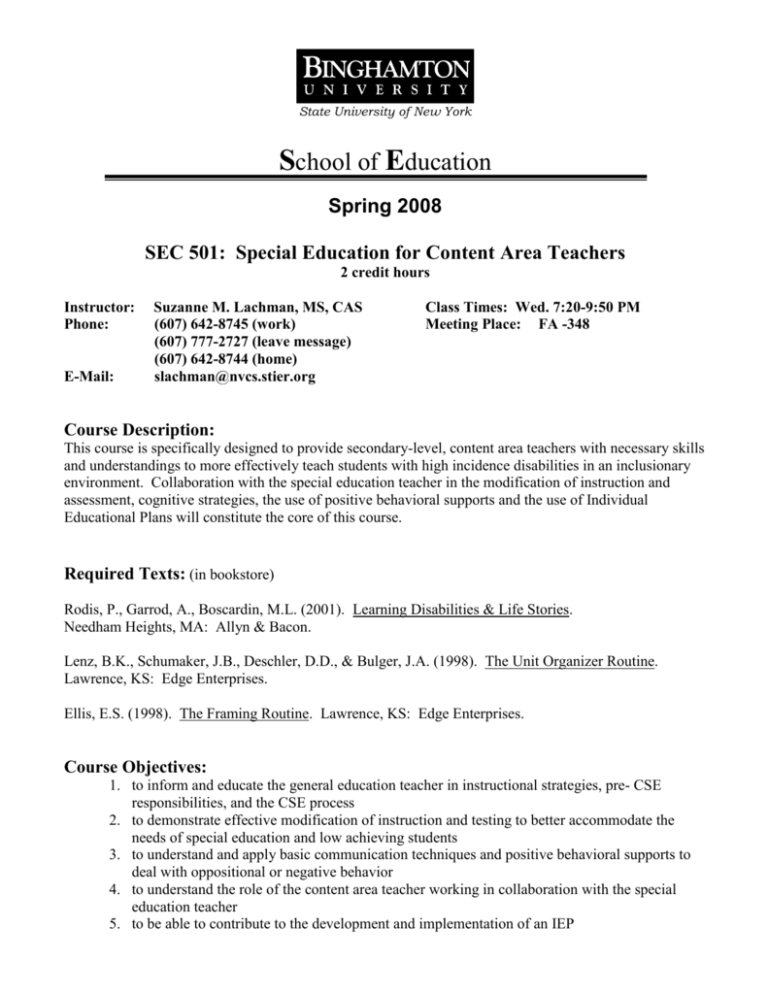
State University of New York School of Education Spring 2008 SEC 501: Special Education for Content Area Teachers 2 credit hours Instructor: Phone: E-Mail: Suzanne M. Lachman, MS, CAS (607) 642-8745 (work) (607) 777-2727 (leave message) (607) 642-8744 (home) slachman@nvcs.stier.org Class Times: Wed. 7:20-9:50 PM Meeting Place: FA -348 Course Description: This course is specifically designed to provide secondary-level, content area teachers with necessary skills and understandings to more effectively teach students with high incidence disabilities in an inclusionary environment. Collaboration with the special education teacher in the modification of instruction and assessment, cognitive strategies, the use of positive behavioral supports and the use of Individual Educational Plans will constitute the core of this course. Required Texts: (in bookstore) Rodis, P., Garrod, A., Boscardin, M.L. (2001). Learning Disabilities & Life Stories. Needham Heights, MA: Allyn & Bacon. Lenz, B.K., Schumaker, J.B., Deschler, D.D., & Bulger, J.A. (1998). The Unit Organizer Routine. Lawrence, KS: Edge Enterprises. Ellis, E.S. (1998). The Framing Routine. Lawrence, KS: Edge Enterprises. Course Objectives: 1. to inform and educate the general education teacher in instructional strategies, pre- CSE responsibilities, and the CSE process 2. to demonstrate effective modification of instruction and testing to better accommodate the needs of special education and low achieving students 3. to understand and apply basic communication techniques and positive behavioral supports to deal with oppositional or negative behavior 4. to understand the role of the content area teacher working in collaboration with the special education teacher 5. to be able to contribute to the development and implementation of an IEP Instructional and Grading: A variety of instructional strategies and instructional approaches will be used in this course – minilectures, small group discussions of assigned readings, modeling, and practice in instructional planning and procedures. Small group cooperative exercises will be implemented wherever appropriate. Grading will be on the basis of an individual project involving strategic unit and lesson planning in the student’s content area and a presentation of the project to the class (50% of the grade, rubric to be provided), and a take-home, short essay exam (50% of the grade). All students are expected to participate in class discussions and activities. The instructor reserves the right to adjust the final grade on the basis of class participation and attendance. Classroom Environment: The faculty and staff in the School of Education are committed to serving all enrolled students. Our intention is to create an intellectually stimulating, safe and respectful class atmosphere. In return, we expect that each of you will honor and respect the opinions and feelings of others. Accommodations: If you are a student with a disability and wish to request accommodations, please notify the instructor by the second week of class. You are also encouraged to contact the Office of Services for Students with Disabilities at 777-2868. Their office is LH-B51. This office makes formal recommendations regarding necessary and appropriate accommodations based on specifically diagnosed disabilities. Information regarding disabilities is treated in a confidential manner. Academic Honesty: It is the expectation that all students assume the responsibility to maintain and foster a condition and an atmosphere of academic integrity for the academic work they submit. This requires that all classroom, laboratory, and written work for which a person claims credit are in fact that person’s own work. Please refer to the annual university Student Handbook publication that includes detailed information on academic integrity. Students are in violation of academic honesty if they incorporate into their written or oral reports any unacknowledged published or unpublished or oral material form the work of another (plagiarism); or if they use, request, or give unauthorized assistance in any academic work (cheating).” (SEHD Academic Honesty Policies) Plagiarism and cheating will not be tolerated in this class. Incidents of either will result in a failing grade for the assignment in question. If you have any questions about what constitutes plagiarism or cheating, please be sure to ask the instructor. http://sehd.binghamton.edu/students/currentstudents/academichonesty.htm Blackboard: Course handouts will be posted on Blackboard (BB). You can e-mail classmates and discuss course readings and class topics there. (You need a BU ID to access BB & online library journals. You may print 100 pgs/wk free in any campus computer pod). Directions: 1. Go to http://blackboard.binghamton.edu 2. Login using the first part of your Binghamton email address (Use BUSI to find out your BU email if you don't already know it) http://busi.binghamton.edu/ (go to active accounts) - you need the pac number from your BU student ID to login on BUSI If you don’t know your PAC, contact the Registrar's Office for instructions on how to obtain a replacement PAC --- 607-777-6871. 3. Your initial password should be the first two letters of your last name & the last four numbers of your Soc. Sec. #. You can change your password once you are logged in. 4. Once logged in you will see a list of your classes using BB & announcements. 5. Click on the class link you want to enter. From there you can view class documents SEC 501 Tentative Class Schedule Spring 2008 1/28 Introduction to the class and to each other – syllabus, etc. Special Education: What it is and the impact on content area teachers General overview of the history, law, and delivery of services CSE process and the general education teacher role and responsibilities Read: Ellis, The Framing Routine 2/6 Classifications and definitions Modification of instruction – Framing and Anchoring F.A.T. City video Read specific selections from Rodis, et.al. Learning Disabilities and Life Stories 2/13 Living with a disability Panel discussion of Life Stories Read: Lenz, et.al. Unit Organizer Routine Project will be assigned 2/20 Accommodations and modifications Differentiating instruction Read assigned article #1 (see Blackboard) 2/27 Effective classroom practices Collaboration & Co-teaching models Guest speakers – general ed. and special ed. teacher to present opportunities and challenges faced in a co-teaching setting at the secondary level Assign: Read article #2 (see Blackboard) 3/5 Student project presentations Assign take home exam 3/12 Collect take home exam Manifestation Determination Review Behavioral disorders – guest speaker - TBA Course Closure



